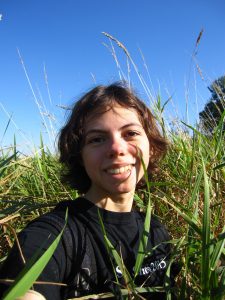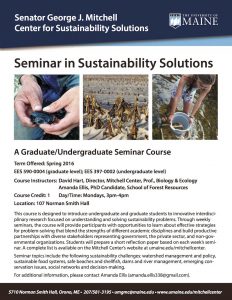Weekly Dose of Sustainability, with a Dash of Hope
By David Sims
For UMaine Honors College freshman and Ecology and Environmental Sciences major Chantal Bussiere, signing up for the one-credit Seminar in Sustainability Solutions (EES 397) class offered each semester by the George J. Mitchell Center for Sustainability Solutions was a no-brainer.

Her initial interest piqued by a campus flyer, Bussiere attended a seminar on agricultural sustainability in February 2016, found it “fascinating,” and thereafter attended every seminar, all of which take place Mondays from 3 to 4 p.m. at the Mitchell Center home in Norman Smith Hall on the UMaine campus.
She would have done so even had she not signed up for EES 397.
“I really like seeing all of the new research that’s going on and new developments in sustainability,” says Bussiere who went to Norfolk County Agricultural High School in Walpole, Massachusetts where all students choose a major under three broad categories: Animal and Marine Science, Plant and Environmental Science, or Mechanical Technology. Bussiere eventually became a Natural Resources major.
“So I have a good background in science from high school—what’s already established—but the Mitchell Center seminars tend to be eye-opening about topics in sustainability science, which I don’t know as much about. And since that field is always changing the seminars are a good way to keep you up to date on what’s current,” Bussiere says.
At each seminar Bussiere takes copious notes and, as required by the class, writes up a one-page reflection on the topic. The one-pager includes a brief summary and a more in-depth treatment of a specific aspect of the seminar, for example, how the research might be synergistic with topics from other seminars or other ecological or sustainability concepts.
“…seeing all these Mitchell Center seminars is like seeing all the potential branches my career path might take.” — Chantal Bussiere
“It’s pretty open as to what you can write about and you can tie it into your own experiences if you want,” says Bussiere, who adds that because it’s such a win-win proposition she always encourages other undergraduates to attend the seminars and sign up for the EES class.
Bussiere chose UMaine over a smaller environmentally-oriented college because she liked the look and feel of a big campus in a rural setting and the fact that it had large, cutting-edge research facilities. Moreover, the offer to join the Honors College that accompanied her acceptance letter also played a role in her decision—a decision that put her on a rigorous liberal arts path in combination with her focus on natural science.
For example, instead of the general education requirements mandated for first-year and sophomore students, at Honors, four courses constituting Civilizations: Past, Present, and Future follow a chronological trajectory from earliest recorded times through the present, examining philosophy, history, literature, the arts, and natural, physical, and social sciences. In particular, by incorporating primary sources, small group discussions, and multiple perspectives, these courses explore the way in which civilizations and cultures have been developed and have interacted with others.
Mind opening
“It’s an interesting mix because Honors is very liberal arts while everything else I’m doing is totally science-oriented,” Bussiere says. “It feels like having a minor or a double major because that one Civilizations class is so much work and is so different from everything else I do, but it really opens your mind and deepens your analytical abilities and view and understanding of cultures in general. I really like it, it’s worth the work.”
Bussiere adds that she feels the rigors of Honors will definitely carry over and apply to her having the ability to think of multiple solutions to scientific problems or data analysis.
As an EES major with a forest ecosystems concentration—“which is a pretty close analog to my natural resources major in high school”—she tends to be particularly drawn to Mitchell Center seminar topics in that general area of research. That said, to her, part of the richness of the eclectic, interdisciplinary seminars is that they provide “a good means of learning about paths you might be able to do follow but would otherwise not be exposed to.”
 For example, a seminar last February on farmers, bees, and pollination might not have been strictly up her alley but she was drawn in because the researcher, Ph.d. student Brianne Du Clos, described herself as a “landscape ecologist.”
For example, a seminar last February on farmers, bees, and pollination might not have been strictly up her alley but she was drawn in because the researcher, Ph.d. student Brianne Du Clos, described herself as a “landscape ecologist.”
“I want to work with plants, but I also want to be an ecologist, so that attracted me. I thought her research was really interesting and was something I might want to do in the future.” Bussiere adds, “I know what I’m interested in in a broad sense but don’t have an idea of exactly what I want to do, and seeing all these Mitchell Center seminars is like seeing all the potential branches my career path might take.”
Bussiere notes further that, for her, the seminars can even inspire hope in the face of seemingly intractable environmental, social, and economic problems. For example, topics that are centered on or have an element of eliciting changes in social behavior or that are aimed at educating young children in sustainability science topics and principles give her reason to be more hopeful about the future.
A seminar focused in part on the social side of shellfish harvesting struck just such a chord. Bussiere says the researcher, Bridie McGreavy, noted how the clam diggers taking part in the study were drawn in because the scientists were genuinely interested in their role and points of view and wanted to hear how they thought they might be able to work more sustainably.
Says Bussiere, “I think that’s one of the most important aspects of sustainability—you can do the research but then you need to get the public involved in doing what needs to be done. That’s something that gives me hope for the future—that people do actually care and are willing to make a change for the benefit of all.”
